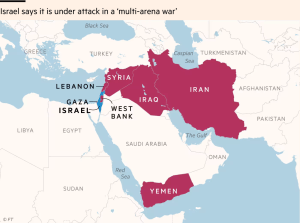The Model UN Administration
The Biden-Harris administration runs foreign policy like it is Model UN; its approach to Lebanon is a perfect encapsulation of this flawed strategy.
Model UN is a longstanding staple of many a high school classroom across America. It involves roleplaying as the United Nations ambassadors for a wide variety of nations, usually randomly assigned. The students act as their countries would through a number of typical UN sessions, from the Security Council to the General Assembly and various smaller subgroups. Usually drawing the overachievers, the history nerds, the proto-politicians, and other assorted riff-raff, the club is a haven for geeks and those who follow the news way too closely. I would know – I was one of them. My Model UN tenure was relatively brief and ended entirely of my own doing. This was back in 2004 and I was given the role of ambassador for North Korea, a position I approached with relish.
Of course, as a pariah state whose only means of geopolitics was (and is) nuclear threats, I leaned heavily on saber-rattling of the radioactive kind. I cajoled and bullied other Asian nations to get my way, constantly attacked the South Korean representative as a capitalist running dog, and generally made a mess of the proceedings. To me, I was doing everything I could to advance the actual geopolitical interests of North Korea. I was playing the bad cop pretty much every session, but that’s what makes sense for the government of a pariah state. Of course, that didn’t endear me to either my fellow Model UN representatives or the progressive teachers who moderated the sessions. But that wasn’t my problem; I was there solely to zealously represent the interests of the glorious Dear Leader Kim Jong Il.
My wrench in the gears only served as a source of constant amusement for myself and a minor inconvenience for everyone else, as the outcomes were largely certain from the outset. Inevitably, diplomacy would prevail and the ‘right’ result would be reached after a highly stage-managed process. There was no ability to do anything other than make that predetermined result just a tad more difficult to get to. Anytime there was a real issue, the moderating teachers would step in and right the ship. It was basically all kumbayas and hugs. Which – as I intuited then and have definitively learned as I have studied diplomatic history more recently – is precisely the opposite of how the world of diplomacy works.
In reality, international negotiations are a nasty game of intrigue, hidden motives, duplicity, and aggression in the military realm. Politics has been described as war by other means, and diplomacy surely makes that point clear. However, in Model UN World everything is carefully curated to ensure comity and friendship. That may be fine for a high school debate club – my personal opinion aside – but it makes for a poor model for geopolitical actors on the actual world stage. Unfortunately, the Biden-Harris administration has adopted the Model UN worldview as its own. And the results have predictably ranged from tragedy to farce. I’ve written on this topic before, for National Review, where I laid out the consequences of the administration’s fetish for negotiation:
“At some point, the Biden team’s use of diplomacy as the be-all and end-all fits the famous definition of insanity: doing the same thing over and over again while expecting different results. In the war in Gaza, the White House’s insistence on diplomacy has harmed Israel, prolonged the suffering of hostages, and undermined our national interests. It has failed in every possible respect, including the latest egregious attempt to deter a necessary Israeli push on Rafah, Hamas’s last redoubt.
The administration’s diplomats have been too busy talking to hear the sound of the enemy loading its guns. In fact, this diplomatic obsession has made conflict more likely, as it has put America and its allies at an unnecessary disadvantage. For that, this administration will be remembered fondly in the capitals of our foes, but likely nowhere else.”
I penned those lines back in May of this year, but they have come back in force during the new ceasefire push against Israel, this time in Lebanon.
As the war in Gaza has begun to wind down in terms of active major military operations, Israel has shifted its focus to the six other theaters from which they are being attacked: the West Bank, Iraq, Iran, Yemen, Syria, and, most importantly, Lebanon. The past month or so has seen a veritable whirlwind of Israeli successes – assassinating Hamas leader Ismail Haniyeh in an IRGC compound in Tehran, taking out a wide variety of terrorist cadres, and successfully crippling Hezbollah’s command and control infrastructure through one of the most impressive feats of operational intelligence and sabotage in world history, Operation Grim Beeper. The capstone on that incredible month has been the assassination of Hezbollah’s long-time leader and arch-terrorist, Hassan Nasrallah, followed by precision aerial strikes to destroy a significant percentage of Hezbollah’s offensive weaponry.
Now, the IDF is ramping up operations and preparing to go in on the ground to push Hezbollah away from Israel’s border, securing the north of the country from indiscriminate rocket attacks. In fact, this operation is fully in line with UN Resolution 1701, which was promulgated in 2006 to ensure that Hezbollah was forcibly removed from the area south of the Litani River in southern Lebanon. The Lebanese military, alongside a UN force known as UNIFIL, was supposed to accomplish this mission while Israel fully withdrew from Lebanese territory. Israel held up its end of the bargain, removing every IDF soldier from Lebanon proper. But, of course, the UN and the Lebanese military – which is both aligned with and far less powerful than Hezbollah – did nothing of the sort, allowing Hezbollah to entrench itself in southern Lebanon and build out its massive stockpile of advanced weaponry supplied by Iran. Now, after dealing with constant bombardment by Hezbollah forces since October 8 of last year, Israel is taking the fight to its Iranian-Lebanese terrorist enemy.
For the Model UN administration currently residing in the White House and at Foggy Bottom, this is a shot across the bow of their sacred cow: diplomacy. The administration has come out with a push to force Israel into a counterproductive ‘ceasefire’, one that would only allow Hezbollah to regroup, rearm (with help from Tehran, naturally), and continue its assault on Israeli civilians. The proposed 21-day ceasefire – supported by the US, France, the EU, Canada, Australia, and a smattering of Gulf states – would be meant to allow “negotiations” to take place, de-escalating the conflict and allowing for a ceasefire in Gaza as well. In theory, this would end the state of war in the Middle East and everyone would be happy. This is how the Model UN folks want the world to work. But it isn’t remotely how it actually functions in reality.
Sometimes, diplomacy is a dead end, especially when one side seeks the genocidal destruction of the other. Unmentioned in the ceasefire proposals is the word “Hezbollah,” which gives the whole game away. Israel is not fighting a rational nation-state; it is dealing with an existential conflict against Islamofascist terrorists bankrolled and supported by the totalitarian theocrats in Tehran. That reality simply does not fit within the simplistic Model UN paradigm, so it is avoided entirely. Instead, we get repeated calls for an end to fighting that would only constrain the legitimate national actor, Israel, while allowing its terrorist enemies to continue their multifront war against the Jewish state unabated.
To continue with this theme, President Biden (as much as he actually is the acting president today) has stated that he will talk to Israeli PM Benjamin Netanyahu to avoid “an all-out war” in the region. But Israel is not the one driving this conflict; it is the government of Iran and its regional proxies that have stoked and escalated this conflict consistently since October 7, 2023. Dealing with those malign actors would be the proper way to end this war, but they only understand the language of force, hence the Israeli retaliation. The necessary and proper use of force to achieve national ends is anathema to the Model UN set, so Israel is painted as the bad guy and its enemies are essentially ignored, or worse, treated as though they simply have no choice but to attempt a genocide against the Jews of Israel. It is Israel’s fault that diplomacy isn’t working, even though Jerusalem has repeatedly agreed to ceasefire terms that its terrorist foes repudiate. No matter. Israel is the one breaking out of the Model UN mold, so it must be the one pressured and held to account.
This is a fundamentally flawed and naïve way to view international relations and run foreign policy. It tries to force messy geopolitical realities into a neat and tidy box. It seeks unity and friendship between intractable foes. It seems to think that everyone is just one conversation away from putting down their arms and embracing each other in a big ole bear hug. In real life, you can’t just ignore the North Korean ambassador doing his saber-rattling best, nor can you pretend like evil can be negotiated with. But this is the Model UN mindset: ignore anything inconvenient and get mad at the nations who realize what a farce this approach actually is.
The Biden-Harris administration has made the Model UN paradigm the center of its foreign policy approach; a potential Harris-Walz administration would likely do the same. Thankfully, allies like Israel are simply ignoring this idiocy and doing what they need to do to secure the future of their national interests and security. And unfortunately for the Model UNers, there are no progressive teachers-cum-moderators to bail them out. They’ll have to deal with the world as it is, not the world as it appears in a mock-up high school version of geopolitics. True statesmen like Netanyahu and others should have one message for the Model UN administration: sit down, shut up, and let the adults do the work.



